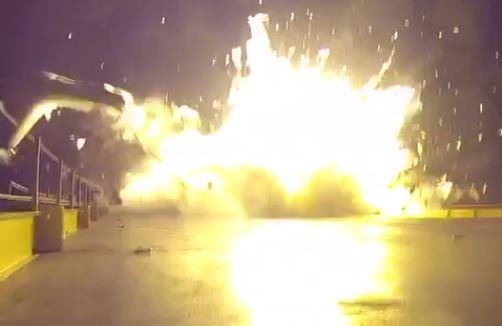Yesterday, Space Exploration Technologies, or SpaceX as it is more commonly known, attempted to launch a rocket carrying supplies and equipment to the International Space Station (ISS). There are currently astronauts inhabiting the ISS for a one year journey, two of whom are Scott Kelly and Mikhail Kornienko. The stage two Falcon-9 unmanned spacecraft that was sent up to them contained food, supplies, and materials for science experiments. This was just an ordinary rocket launch that went off without a hitch, and the craft should reach the ISS by Friday. What was unique about this launch was what SpaceX was trying to do afterwords. They were trying to land a rocket stage on a floating barge in the ocean. How the liftoff occurs is that the booster with nine engines controls the initial liftoff through the first 160 seconds of the flights. The booster then detaches from the capsule at the top, which was carrying two tons of cargo the the space station. After the booster runs out of fuel, it detaches from the capsule which has its own single engine to take it the rest of the way.
Now, what traditionally happens is the detached engines just crash into the sea. What SpaceX was trying to do was land the stage of the rocket on a barge in the ocean. Really, the only reason that they are trying to accomplish this is to save money. Elon Musk, the companies owner, says that if anyone can figure how to "reuse rockets just like airplanes, the cost of access to space will be reduced by as much as a factor of a hundred." Saving and reusing space equipment would cut down the cost of space travel so much so that space explorations would be much cheaper to commence. This attempt yesterday did end up in failure though. The rocket did hit the unmanned barge in the ocean, but it landed at a strange angle and exploded. This did not deter SpaceX though, who plans to keep trying at this until they succeed. The eventually want to be able to land rockets on land safely to be reused.
http://www.nytimes.com/2015/04/15/science/spacex-comes-close-to-recovering-rocket.html?ref=space&gwh=2674928D8C955A888E6C882B2D4D4C3D&gwt=pay&_r=0


You know, Owen, that if the rocket comes back to earth, it doesn't really count as being in an "outer origin" as your blog title implies. :) It would make more sense, in my opinion, to send a rocket up there that they can salvage and help repair or improve various aspects of the ISS.
ReplyDelete